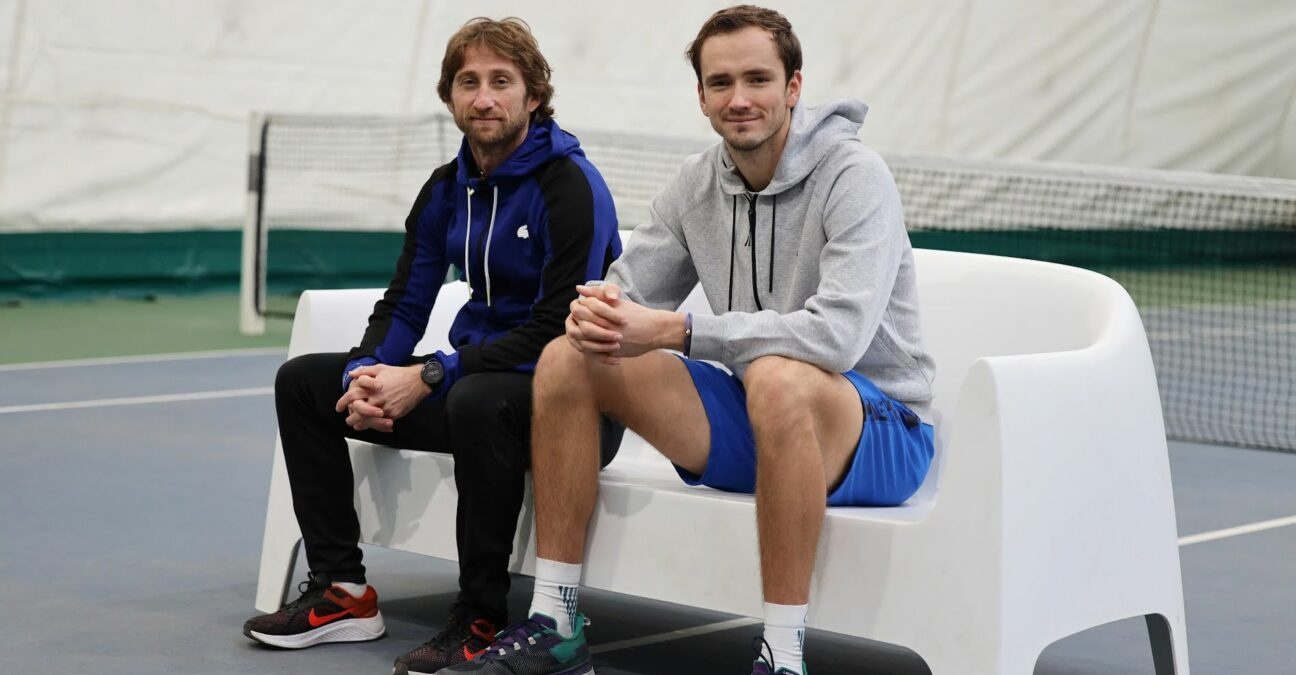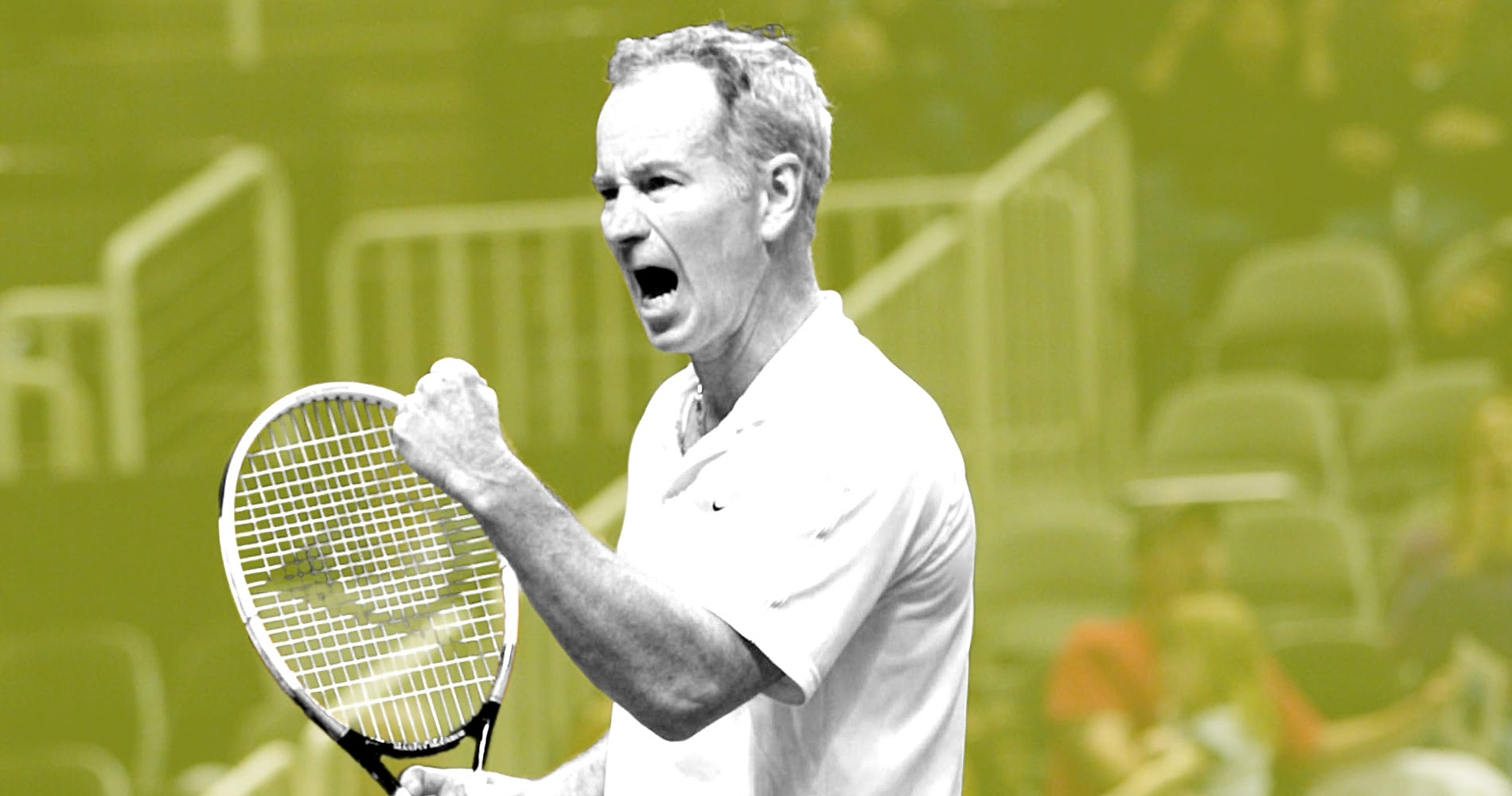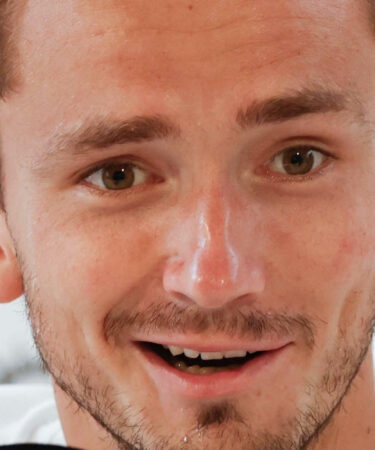“It’s a situation I don’t want to be in, so I leave”: Cervara explains his habit of leaving during Medvedev’s matches
Gilles Cervara is known for not hesitating to leave the box when his player Daniil Medvedev loses his brain on the court. Here he dishes on why and also on Medvedev’s reactions to it.
 Gilles Cervara and Daniil Medvedev, 2022 | © Tennis Majors
Gilles Cervara and Daniil Medvedev, 2022 | © Tennis Majors
At the end of last season, Gilles Cervara did it again: he left Daniil Medvedev‘s box before it was time to. In Halle, he left during the match, and in Vienna, he innovated and left before the trophy ceremony. In a sport where the player pays the coach and is therefore the boss – and especially with a top player – it has become very rare to see coaches risking to alienate their charges. Yet, both for his own sake and for Medvedev’s, Cervara keeps hitting that trigger. It is both an I-deserve-respect move and a last resort strategy to get his player back on track.
For Major Talk, Gilles Cervara explained the reasoning behind all of this. Most important: he never leaves the court in order to make Daniil Medvedev feel bad about himself.
“I don’t want to go through it”
“First of all, when I decide to leave, it’s not just to go away and then tell Daniil: ‘You didn’t do this, you didn’t do that.’ Or: ‘I’m not happy with that.'” Cervara said. “It’s that there’s a situation I don’t agree with, that I don’t feel comfortable with, and I have the right to feel that way, to disagree. So I don’t want to go through it. It’s a situation I don’t want to be in, so I leave.”
“In Halle during the game, we got to a point where he’s expressing extreme frustration in my direction. And as a coach in the box, you can’t answer. It’s very difficult. Or we should be able to sit down and have a discussion. But that’s impossible. If I react like him by shouting, to shut him up, it can happen once or twice, but it’s going to put more fuel on the fire. So that’s not the point.”
Cervara admits he tried to do that in the past, to yell back at Medvedev but it’s not a winning strategy anymore.
“I’ve done it in the past, in the middle of a match, and it was successful. It worked because we weren’t at the same place on the path. And this is where the path evolves. So as I know more or less that now it’s not going to have the expected effect anymore, my only possibility because I don’t accept what’s going on – to stay like this until the end of the game when you have a player who’s going crazy all over the place – is that I take my bag and I just leave. That’s it.”
“He’s aware that something has to happen”
Of course, everybody wonders how Medvedev reacts when they cross each other after a match where his coach has just left him stranded!
“I think he takes it very well because he’s aware that something has to happen. Otherwise, I accept something that is unacceptable. And that’s not good either. And then there’s the discussion that follows. An explanation where I express my anger, my dissatisfaction, or my disagreement about this. And he’s going to apologize. We’re going to try to understand how we got here, how we can get there.”
As for how Cervara takes it when his player yells at him during matches, no surprise here: “Obviously it’s hard, even though I try to have some distance and it slides over me or it bounces off me. It’s not all the time.”
It also says a lot about the state of their relationship that Cervara can decide to walk away from a trophy ceremony! There’s an honesty there and it’s surely why Medvedev keeps working with him. Top players most of the time understand they don’t need “yes people” or travel buddies as coaches, but people who – in a sea of admiring entourages – are going to tell them like it is.
“I’m tired of Daniil’s celebrations and speeches”
“In Vienna, it’s quite special. Because it comes at the time of the award ceremony because I’m tired of Daniil’s celebrations and speeches. As a coach, I would like to see something more exciting, a little bit warmer. More sharing too. And since there’s not that, that you’re here waiting for for the awards ceremony, and it can be long at times, and that you know that not much is going to happen… I don’t like that feeling of waiting for nothing and so when being subjected to something that I don’t necessarily like, I leave. And here, I left. I’m not saying that I will do it every time, but I didn’t want to stay. And I told him after the game. He’s free to do what he wants, I’m free to do what I want too. That’s it.”
People in this post
More tennis news
Raducanu reduced to tears by spectator mid-match in Dubai; WTA issues statement

Rybakina saves six match points against Badosa to make quarters in Dubai

Swiatek bagels Yastremaska to reach Dubai Open quarter-finals

February 19, 2006: The day John McEnroe came out of retirement to win a doubles title at 47

Noskova ousts Pegula to move into Dubai Open quarter-finals







